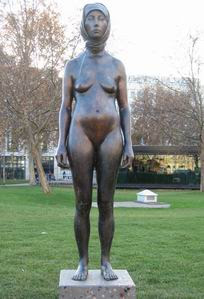 28 Şubat 2010
28 Şubat 2010Koray Doğan Urbarlı, Yesil Gazete
Gerçekten mükemmel bir ülke burası… Her şeyiyle. Bir önceki yazımda biraz değinmeye çalıştığım gibi, her tartışma programında aynı kavramlar var. Demokrasi! Özgürlük! Eşitlik! Birlik! Kardeşlik! Herkes birbirini daha az demokrat olmakla suçluyor. Gören duyan itiyor sanacak. Daha iyiye, daha iyiye… “Haydi, bak, x partisi %40 kadın kotası getirmiş, biz daha iyisini yapmalıyız %50 getirmeliyiz!” “Y partisi seçim barajını %4’e indirmeyi teklif edecekmiş, biz önce davranalım %3 ve her ilde de önseçim zorunluluğu teklif edelim!”
Bu tip konuşmalar duyuyor olmamız gerekiyor. O kadar çok demokrasiden, özgürlükten bahsediliyor ki; düşünce aleminin tüm büyük babaları burada parti yönetiyor ya da danışman sanki.
Ama değil. Ne yazık ki değil. Antitez’den ufak bir örnek verip, teze geçelim ama orada kalalım çünkü sentez çok fena. Sentez ortada… CHP, İzmir’de yarın (artık bugün olmuş) il kongresini toplayacak. Aslında kongre toplandı bitti. Deniz Baykal, kafasında kongreyi topladı. Herkesin olur dediği, ilçe kongrelerini adıyla geçiren adaya çekil sen dedi. Uzun süre bir aday aradı ve gençleştirmeye gittiği (ironi değil, partinin açıkladığı hedeftir bu) bir ilde 80’ine yakın bir kişiye “ol” dedi. Yarın da delegeler olduracak. Çekilen adaya da herhalde bir 5. sıra milletvekili adaylığı falan verirler, ya da vermişlerdir. Müthiş demokrat kent İzmir’de, büyük sosyal demokrat partinin hali bu. Bu antitez. 2011’de başbakan olacağını düşünen, bunun planlarını kuran kişinin yaptığı ettiği. Zaten başlıktaki başbakan, kişiyi değil, bir makamı işaret ediyor.
Gelelim teze… Bir süre önce, Tayyip Erdoğan, “Şu gazeteciler biraz daha az yazsalar, ülkenin sorunları azalır” anlamına gelen bir cümle söyledi. Daha sonra, Tekel İşçileri ile ilgili her konu açıldığında, bunu medyanın büyüttüğünü, medyanın gündemde tuttuğunu söyledi. Yazmayın dedi. Erdoğan, bütün köşe yazarları mı yazmasın dedi, yoksa Fehmi Koru modeli gibi bir Fehmi Koru, Bir Taha Kıvanç olup yazarlarsa bir sorun olmaz mı demek istedi, yoksa benim sevmediğim yazarlar yazmasın yoksa bazı gazeteler var onlar günde iki kere çıksın mı demek istedi bilmiyorum. Yoksa, başbakan’ın örneğin Mehmet Barlas’ın yazmasına nasıl bir itirazı olabilir ki? (Barlas çok yanlı yazıyor demek istemedim, yanağını okşatmıştı ya ondan…)
Yazarların, günler pek azalmamış olacak ki, birkaç gün önce başbakan yeni bir açıklama yaptı ve bu sefer yazarları değil, işverenlerini muhatap aldı. “Şu yazarlara da yazdırmayın bakın! Yazdırıyorsunuz, borsa düşüyor, muhalefet oluyor. Borsa düşüyor. Bunlara yazı yazdırıp yazdırıp, sonra bizim kapımıza geldiğinizde de ağlamayın.” Anlamına gelen cümleler söyledi. Açık açık olmasa da gayet açık şekilde, bize muhalefet edeni, hükümetin yaptıklarını eleştireni barındırmayın dedi. Bu, “hükümetin yaptığı her şey ülke için iyidir, hükümeti eleştirmek ülkenin iyiliğini istememektir” anlayışıdır ve hükümetin de tek bir kişiye mutlak bağlı olduğunu düşünürsek (sosyal demokrat partinin halini üstte yazdım. Bunlar da muhafazakâr.) bu anlayış ancak ve ancak otoriter bir yönetimde geçerli olur. O yüzden, böyle laf edilebilir mi Türkiye’de? Ediliyor ama edilemezmiş gibi konuşulup ediliyor. Her şeyin en iyisini bilen insanlar, demokrasinin onların bildiğinden daha iyisini söyleyemeyeceğini düşünerek, demokrasiye evet diyorlar. “Özgürlük mü istiyorsunuz? Tabii ki. Nasıl olsa, benim söylediğimden daha iyisini söyleyemeyeceksiniz. Zaten, size özgürlük veren birini eleştirecek kadar da özgürlük düşmanı olamazsınız!”
Şimdi, bir yere kadar tabii ki kızabilir başbakanlar, bakanlar, muhtarlar… Gerçekten hükümet karşıtlığını bodoslama yapan gazeteler yok mu? Var! Var da, tam tersi de var. Hükümet gak dese bir bölüm gazete “RTE yine gakladı diye yayın yaparken, bir bölüm de, “tarihin en muhteşem gaklaması Birinci Recep Tayyip Sultan Han’dan geldi” diye haber yapıyor. İkisi de iğrenç. Peki, neden bir tanesine kızalım biz? Neden eleştirinin bağnazına bu kadar tepki verirken, yanında olmanın bu kadar samimiyetsizine “yürü ya kulum” deniyor?
Türkiye’nin yönetim anlayışı kaymıştır artık. Gücü elinde bulunduranın kendi diktatörlüğünü ilan ettiği bir garip mikro ve makro diktatörlükler takımadası oldu Türkiye. Herkes, bulunduğu alanda en ufak bir muhalefet tutmamayı, orayı temizlemek olarak görüyor. Temizlemek kelimesi kullanılıyor zaten. Pisliklerden arındırmak. Bu bazen o kadar feci sonuçlar doğuruyor ki, başbakan köşe “yazarları yazmasın” diyebiliyor, ulaştırma bakanı “demiryollarını kapatalım” diyebiliyor. Mutlaklar çünkü. Hiç gitmeyecekler oralardan. Böyle düşünüyorlar. Ben ülkeyim diyor başbakan. Beni eleştirmek ülkeye hakaret, ihanet. Ben partiyim diyor parti başkanı, benim aday ol demediğim adam aday olamaz hiçbir yere. L’etat c’est moi (Devlet benim!) demiş kral. Ama bakın, 14. Louis, o kral. Siz ise kral değilsiniz. Ama kral gibi davranıyorsunuz. Laflara bakarsan da liberte egalite fraternite (özgürlük, eşitlik, kardeşlik)…








